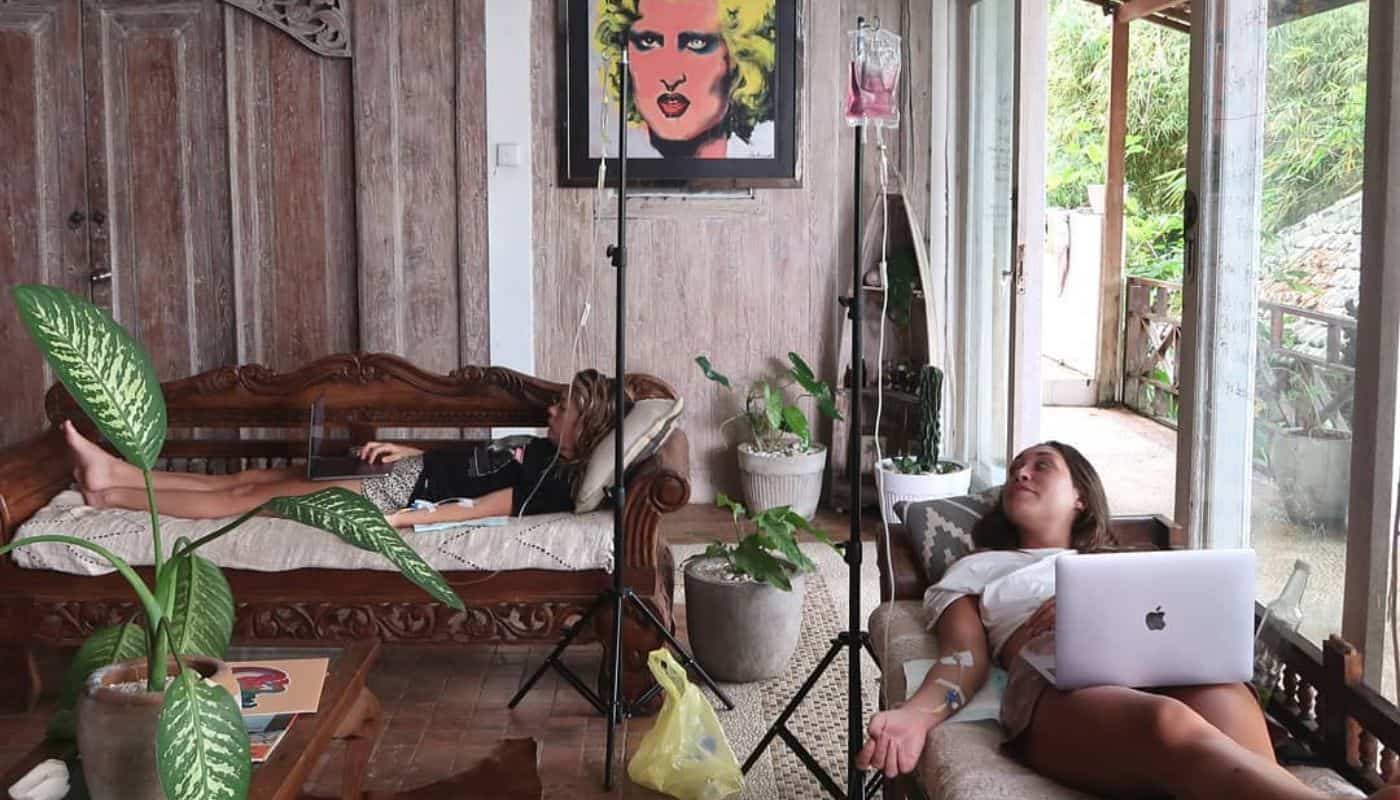Nothing can ruin your holiday to Bali much more than getting sick.
With stunning tropical landscapes and interesting food comes the risk of mosquito-borne illnesses, heat stroke, and stomach bugs. Many of these illnesses have mild symptoms and no long-term consequences, and they definitely shouldn’t turn you off from exploring the idyllic island!
Whether you’re reading this from your bed already infected with a tummy bug in Bali, or are planning a trip and want to prepare for the worst, this is the ultimate guide for getting sick in Bali! We will fill you in on how to avoid illnesses, and what to do if you do get sick.
Keep on reading!
Common Health Risks in Bali

Any kind of travels have the risk of illness. Being worn out, in a different climate and tackling time changes can have an impact of your body. It can make you tired, with a lower immunity and more susceptible to illness.
Jet lag: The first thing that you might be fighting during your trip to Bali is jet lag. Staying hydrated and doing your best to get in-line with Bali time will be the best ways to help fight jet lag. You can also find IV packages that are aimed at increasing your energy and building up your immunity!
Dengue: Indonesia has one of the highest dengue infection rates in the world. Unfortunately that does make it a risk while exploring Bali. There isn’t a vaccination available, the best way to protect yourself against dengue is to use maximum-strength mosquito repellent, wear long clothes, and sleep under a mosquito net. While the symptoms of this infection can be severe, getting dengue fever is still extremely unlikely and very treatable. As someone who had dengue fever a few years ago, it ain’t fun and will require a lot of doctors visits – travel insurance will be your best friend.
Malaria: The majority of Indonesia is considered low risk for malaria. You don’t need to take any preventative medication before heading to Bali. However, the risk isn’t exactly zero, so avoid mosquito bites however you can including buying plug-ins for your accommodation and top-strength repellent (both are super affordable in local warungs and mini-marts).
Bali belly: The infamous Bali belly (which is just food poisoning) is one of the more common ailments to visitors, expats and locals! More often it is a case of mild diarrhoea, but the worst cases can lead to hospitalisation. The bacterial disease is usually caught by consuming infected water or food (this even includes food washed in infected water). If you are known for having a sensitive stomach, stick to restaurants and avoid ice in your drinks in small warungs. Food poisoning can take down even the strongest of stomachs, so its always best to be cautious.
Animals: In addition to those health risks, Bali is home to some unfriendly and dangerous animals. Monkeys, snakes and dogs are the most known, but there are also jellyfish, ticks and bats to be weary of. Rabies is a problem on the island among monkeys and stray dogs. No matter how tempting, don’t pat the dog.
Others: More serious diseases like cholera, tetanus, typhoid, and hepatitis A and B are also a risk, but these can be avoided with a vaccine. Other unfortunate ways of getting sick in Bali include sunburn, heatstroke, and alcohol poisoning.
Now, this isn’t a list that should scare you from visiting Bali! It just gives you an idea of what to look out for during your holiday.
Pre-Trip Prep

You know what they say; it’s better to be prepared for the worst, and hope for the best.
When it comes to preparing for a trip to Bali, you are gonna want a travel insurance plan that covers illnesses, hospital stays, and injuries caused by motorcycles, extreme sports, or animal bites.
You will want to stock up on enough medication for your holiday. I swear by this list of meds, and keep them on hand for those late night illnesses. Add them to your packing list!
- Paracetamol and Aspirin – for pain and fever
- Amoxicillin – a penicillin antibiotic
- Diatabs, Loperamide, or Imodium – for diarrhoea
- Activated charcoal – for mild diarrhea
- Antimo – for seasickness
- Myonal – for anti-inflammation
- Cetirizine and Actifed – for respiratory infections
- Milanta or Buscopan – for stomach pain
- Voltaren Gel – for muscle pain
- Autan Lotion – mosquito repellent
- Betadine – disinfectant lotion
These are the names as they are sold in Bali’s pharmacies, in case you need to make an emergency run for some diatabs.
It is recommended to get these vaccines before heading to Bali:
- Hepatitis A and B
- Typhoid
- Tetanus
- Cholera
- Rabies – this isn’t mandatory, but its worth it if you are planning to pet cute doggies.
Health and Safety Tips

Give your body time to adjust – a sudden change in your diet, the climate, and the environment can stress your body out. Giving your body time to adjust to the new food and hot weather is the best way to keep your immune system strong!
Carry your mosquito repellent – it’s pretty easy for a day on the beach to turn into a night of beachside cocktails. Carrying your mosquito repellent will ensure you are always ready for those fun evenings without the risk of hella, niggly bites.
Protect yourself from the sun – its so easy to get sunburnt in Bali. You step outside your private villa to walk to breakfast and end up with a red tinge. The best way to stay protected is to ALWAYS wear suncream, even on the grey days. Factor 50+ is always best. And bring it with you, suncream in Bali is SO expensive!
Be wary of cheap alcohol – for those planning some hectic parties, sunset drinks and evenings of dancing, you’ll want to be cautious about alcohol. In the renowned Bali beach clubs, restaurants and bars, you are pretty safe to drink anything. However as you venture off the usual path and explore smaller local bars and cheap spots, be careful with your beverage choice. If it’s cheap, it’s probably not safe – alcohol is sometimes mixed with methanol to keep costs down. If you do head out to these smaller spots, keep it safe with a bottle of Bintang (opened in front of you).
Avoid temporary tattoos – when your lounging on a sun bed on the beach, you’ll have sellers cruising by offering all kinds of things from kites and swords to massages and henna tattoos. These black henna tattoos are mixed with all kinds of things, and can often cause some severe allergic reactions. It’s better to avoid a beachside henna tattoo and go for something more natural with a by appointment artist.
Stay clear of wild animals and dogs – you don’t need to tell me how cute Bali dogs are, between the Balipedia team we have a whole furry crew. However, there is a risk that comes with petting a cute looking street dog. Rabies is a risk on the island, and one tiny bite can be a big problem with many hospital appointments. The best bet is to not pet the doggy, no matter how tempting. If you see a dog in need of help, you can reach out to the expert organisations.
Don’t swim near river mouths – after seasonal torrential rains, Bali’s rivers (which are often polluted with trash and sewage) overflow into the sea. This infected water can cause issues like eye infections, ear infections, and all kinds of infections in any open cuts. If you spot a river flowing into the sea, your best bet would be to avoid swimming or surfing nearby.
Food and Water Safety

Getting sick from food and water in Bali is pretty common. The hygiene practices and way food is prepared may be different from your home country causing sensitivities, and things aren’t as closely regulated – especially on the local street stalls. Typhoid, cholera, and food poisoning are all caused by contaminated food or water.
These few tips will keep you as safe as possible;
Don’t drink tap water – you don’t wanna drink water directly from the tap. That also goes for brushing your teeth, preparing Indo-mie or washing your fruits and veg. The water coming out of the tap isn’t filtered and is one of the leading causes of stomach problems on the island.
Maintain good hygiene – diarrhoea is a big issue on the island and an obvious Bali Belly symptom. Make sure to wash your hands after using the bathroom, touching handles or ATMs, and before eating. I like to carry a small hand sanitiser with me wherever I go to make it easy.
Only eat fresh food – with the tropical climate, fresh food can go bad fast! Just ask the sad looking carrots in my fridge. If you buy fresh ingredients, try to eat them as soon as possible and keep them refrigerated.
Bali Belly

Bali belly is the internet famed way to refer to food poisoning or travellers diarrhoea on the island. It is a gastro disease that is usually caused by bacteria that makes its way into your food or water.
Each individual person’s immune system and gut health is different, making the strength, speed and severity of Bali belly symptoms differ. If you have a stronger immunity, your body might be able to protect itself from certain bacteria. That being said, many people who visit Bali experience the dreaded stomach rumbles and cramps.
Luckily, the unpleasant stomach bug won’t last for too long. Symptoms can go away naturally after one or two days, though it isn’t unheard of for travellers to experience the tummy bug more than once in a short vacation. A severe case of food poisoning can last between one to five days, with symptoms getting better towards the end.
The most common symptoms are stomach pain and cramping, diarrhoea, low energy levels, and a decreased appetite. Some people may have nausea and vomiting, as well.
There are many local treatments that can help aid and ease the symptoms. You can try drinking coconut water for electrolytes, taking charcoal tablets to ease the diarrhoea, diatabs for the same problem and nibbling carbs like bread or biscuits to keep your appetite up.
If your symptoms last especially long, you are at risk of becoming dehydrated. You will want to see a doctor and get a diagnosis is the symptoms last more than a week.
Pharmacies and Medical Facilities

Most of the time, tourists with tummy bugs are told to relax at your accommodation, and stay hydrated.
If you experience severe gastro symptoms for a long period of time, or have reason to believe you have contracted something more serious like dengue fever or a coral cut infection, you will want to get yourself to a medical facility as soon as possible.
Since Bali is a tourist hotspot, there are tons of Western standard hospitals and clinics dedicated to treating foreigners – usually with a high level of care (and price tag to match). There are lots of hospitals in Bali around the tourist areas.
There are also some on-call doctor services for those not able to get to the nearest clinic. Medi-Call and Prime Plus Medical are two of the most popular home visit services.
When getting sick in Bali, rehydrating with an IV drip will help get you back on your feet in no time. Saline Bali have a range of saline infusions and therapies to help your recovery. Not only are these great after being ill, but they are also very popular for hangovers and pre-flights for a vitamin boost.
When it comes to pharmacies and clinics (locally known as ‘apotek’), Kimia Farma and Guardian Pharmacies are large and trustworthy chemist chains that can be found all over the island. Many of the medications we mentioned above can be bought over the counter.
If you need medicine but can’t get yourself to a pharmacy, medicines can be ordered using trusty Go-Jek and Grab. Go-Jek’s medicine delivery service allows you to skim through a list and order medication 24 hours a day – now that is convenient!
Final Thoughts
From a classic case of food poisoning to dengue fever or wound infections, it’s worth knowing what to do when in case you end up getting sick in Bali.
Knowing names of medications, health and safety tips and trusted health service providers will make your time being ill and little easier.
Travel insurance will always be the number 1 tip we have for making sure you are as safe as possible during a holiday in Bali.
Featured image: Bali Airport




